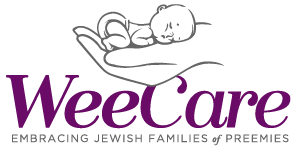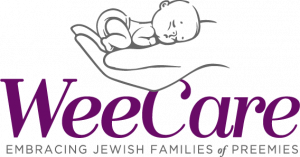On Chanuka, we contemplate the nature of miracles. We see how, if Hashem so desires, the weak can prevail against all odds. The days of Chanuka are considered yemei ratzon, a time of Divine favor. It is also a time for exchanging gifts. The best gifts are usually surprises, and good ones take a lot of planning.
Well, 21 years ago, I was the astonished recipient of a series of incredible Chanuka gifts, involving a great deal of advance planning by the Ribono Shel Olam and a good bit of miraculous intervention on His part. This is my pirsum nissah.
* * *
Act I: The stage for my Chanuka surprise is set on a sleepy Thursday at the end of summer, on 11 Av. On that day, aka August 2, 1990, the Food and Drug Administration, after years of clinical trials, decides to approve Exosurf Neonatal, a synthetic surfactant to treat premature infants born with Respiratory Distress Syndrome (RDS). A fetus’s lungs start making surfactant at around 26 to 34 weeks of gestation. Without it, the lungs collapse, and the infant has difficulty breathing and receiving enough oxygen. An infant with RDS can suffer brain damage and organ failure, and eventually die. This drug is a big deal.
But I am blissfully unaware of these events. On that fateful day, I am offstage, a young mother in the second trimester of a healthy pregnancy, kissing her baby boy goodbye as she heads out the door to go to work – oblivious to the miracle that would be hers 100 days later.
The summer winds down uneventfully.
* * *
Act II: It is the 101st day. The curtain rises on 23 Cheshvan, a quiet Sunday morning. We are calmly packing boxes for our upcoming move. Suddenly, pandemonium breaks loose, as my baby decides to make an early entrance into the world. He arrives eight weeks premature, weighing barely 1700 grams – and is diagnosed with RDS. When I’m informed of his status, I whisper, “Let’s give him a strong name – like David Hamelech.” But choosing a name is not a priority just yet. The baby is fighting for breath in the NICU. The neonatologist reassures us that they have just administered a new marvel drug, called surfactant, and expect the baby to do well. Baruch Hashem, he is removed from the ventilator within 72 hours of birth.
My little boy slowly begins to gain weight, gram by minuscule gram. Soon he is moved to the “step-up room,” and we contact our mohel to discuss the bris. Rabbi L. tells us that the baby would need to weigh at least five pounds and that, in his experience, preemies typically end up having their bris around their actual due date. My baby’s due date was at the end of Teves! What a long wait for my little neshamale not to have a bris or a name.
* * *
Act III: Rewind to 28 Cheshvan, erev Shabbos. Although he is absent, it is the baby’s shalom zachor. It also happens to be our first Shabbos in our new home. One of our guests quips, “I guess you are going to name him David.” Why is that, we ask. “It’s obvious,” he answers, “Shir mizmor chanukas haBayis l’Dovid,” referring to the perek of Tehilim (30) that discusses the inauguration of the Temple. We laugh politely.
* * *
Act IV: It is erev Chanuka, and miracle of miracles, after only four weeks, “Baby Boy” is discharged from the hospital! He comes home just in time to join his Ima and Abba, his “big” brother, and Babi and Papa around the menorah to see the lighting of the first candle. What a special, unexpected Chanuka gift for all of us – a healthy baby boy. But one last gift remains to be opened.
* * *
Act V: It is 2 Teves, a Wednesday morning. The tables in the social hall are strewn with chocolate gelt and colorful dreidels and piled high with sugary soofganiyot. The excited chatter of the guests suddenly ceases and is replaced by an anxious hush as the kvatterbrings my tiny infant – all five pounds of him – into shul. Rabbi L. gently takes him and quickly proceeds with the bris. A high-pitched wail rends the air. At long last, my little man is entered into the Covenant of Avraham and is named David Refael.
Kisses and hugs are passed around, happy tears are shed, and cries of mazal tov fill the air. My miracle baby manages to have his bris on the eighth day after all – on shemini shel Chanuka, the eighth day of Chanukah! Once again, with Divine intervention, the weak triumphed against all the odds.
The curtain falls.
* * *
That Chanuka, I learned to appreciate how, if Hashem wills it, sundry details can coalesce in the most unexpected ways to lead to a favorable outcome. These outcomes are what we tend to call miracles, and most assuredly, the birth and survival of my preemie was a miracle. Even after all this time, I’m utterly astounded by the tremendous syata d’Shmaya we received that Chanuka that made everything work out exactly right, chasdei Has
in Adina Michelsohn
On Chanuka, we contemplate the nature of miracles. We see how, if Hashem so desires, the weak can prevail against all odds. The days of Chanuka are considered yemei ratzon, a time of Divine favor. It is also a time for exchanging gifts. The best gifts are usually surprises, and good ones take a lot of planning.
Well, 21 years ago, I was the astonished recipient of a series of incredible Chanuka gifts, involving a great deal of advance planning by the Ribono Shel Olam and a good bit of miraculous intervention on His part. This is my pirsum nissah.
* * *
Act I: The stage for my Chanuka surprise is set on a sleepy Thursday at the end of summer, on 11 Av. On that day, aka August 2, 1990, the Food and Drug Administration, after years of clinical trials, decides to approve Exosurf Neonatal, a synthetic surfactant to treat premature infants born with Respiratory Distress Syndrome (RDS). A fetus’s lungs start making surfactant at around 26 to 34 weeks of gestation. Without it, the lungs collapse, and the infant has difficulty breathing and receiving enough oxygen. An infant with RDS can suffer brain damage and organ failure, and eventually die. This drug is a big deal.
But I am blissfully unaware of these events. On that fateful day, I am offstage, a young mother in the second trimester of a healthy pregnancy, kissing her baby boy goodbye as she heads out the door to go to work – oblivious to the miracle that would be hers 100 days later.
The summer winds down uneventfully.
* * *
Act II: It is the 101st day. The curtain rises on 23 Cheshvan, a quiet Sunday morning. We are calmly packing boxes for our upcoming move. Suddenly, pandemonium breaks loose, as my baby decides to make an early entrance into the world. He arrives eight weeks premature, weighing barely 1700 grams – and is diagnosed with RDS. When I’m informed of his status, I whisper, “Let’s give him a strong name – like David Hamelech.” But choosing a name is not a priority just yet. The baby is fighting for breath in the NICU. The neonatologist reassures us that they have just administered a new marvel drug, called surfactant, and expect the baby to do well. Baruch Hashem, he is removed from the ventilator within 72 hours of birth.
My little boy slowly begins to gain weight, gram by minuscule gram. Soon he is moved to the “step-up room,” and we contact our mohel to discuss the bris. Rabbi L. tells us that the baby would need to weigh at least five pounds and that, in his experience, preemies typically end up having their bris around their actual due date. My baby’s due date was at the end of Teves! What a long wait for my little neshamale not to have a bris or a name.
* * *
Act III: Rewind to 28 Cheshvan, erev Shabbos. Although he is absent, it is the baby’s shalom zachor. It also happens to be our first Shabbos in our new home. One of our guests quips, “I guess you are going to name him David.” Why is that, we ask. “It’s obvious,” he answers, “Shir mizmor chanukas haBayis l’Dovid,” referring to the perek of Tehilim (30) that discusses the inauguration of the Temple. We laugh politely.
* * *
Act IV: It is erev Chanuka, and miracle of miracles, after only four weeks, “Baby Boy” is discharged from the hospital! He comes home just in time to join his Ima and Abba, his “big” brother, and Babi and Papa around the menorah to see the lighting of the first candle. What a special, unexpected Chanuka gift for all of us – a healthy baby boy. But one last gift remains to be opened.
* * *
Act V: It is 2 Teves, a Wednesday morning. The tables in the social hall are strewn with chocolate gelt and colorful dreidels and piled high with sugary soofganiyot. The excited chatter of the guests suddenly ceases and is replaced by an anxious hush as the kvatterbrings my tiny infant – all five pounds of him – into shul. Rabbi L. gently takes him and quickly proceeds with the bris. A high-pitched wail rends the air. At long last, my little man is entered into the Covenant of Avraham and is named David Refael.
Kisses and hugs are passed around, happy tears are shed, and cries of mazal tov fill the air. My miracle baby manages to have his bris on the eighth day after all – on shemini shel Chanuka, the eighth day of Chanukah! Once again, with Divine intervention, the weak triumphed against all the odds.
The curtain falls.
* * *
That Chanuka, I learned to appreciate how, if Hashem wills it, sundry details can coalesce in the most unexpected ways to lead to a favorable outcome. These outcomes are what we tend to call miracles, and most assuredly, the birth and survival of my preemie was a miracle. Even after all this time, I’m utterly astounded by the tremendous syata d’Shmaya we received that Chanuka that made everything work out exactly right, chasdei Hashem.
(WhereWhatWhen-Adina Michelson)


